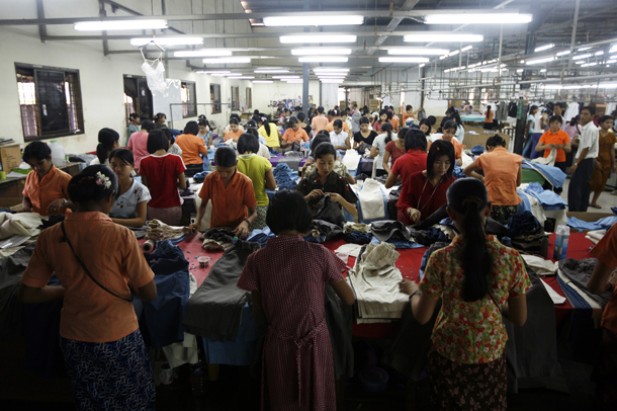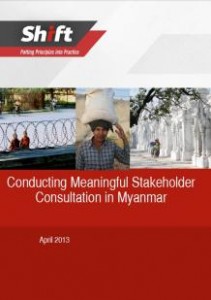Posts Tagged ‘UN Guiding Principles on Business and Human Rights’ (3 found)
Another Wave of Industrial Action Threatens to Drown Burma’s Garment Industry
 The month of February saw sustained and widespread industrial action at garment factories in Rangoon’s industrial zones, with thousands of striking workers demanding better pay and working conditions. Yet the authorities, along with influential private sector interests, have sought to quell the demonstrations without addressing the fundamental flaws in this burgeoning sector, resorting to force and underhand methods as they have done for decades.
The month of February saw sustained and widespread industrial action at garment factories in Rangoon’s industrial zones, with thousands of striking workers demanding better pay and working conditions. Yet the authorities, along with influential private sector interests, have sought to quell the demonstrations without addressing the fundamental flaws in this burgeoning sector, resorting to force and underhand methods as they have done for decades.
The main strikes occurred at E-Land Myanmar, Costec, Tai Yi, Red Stone and Ford Glory factories, located in Shwepyithar and Hlaingtharyar industrial zones. While there are variations in demands across the factories, one which was consistent among the strikers was a pay increase of 30,000 kyat ($30) per month. The average wage of a worker in a garment factory in Rangoon is around 80,000 ($80) per month. This is not a living wage and barely enough to survive, while a complex system of overtime and bonuses means that basic wages are extremely low, thus forcing workers to work an extra three hours per day, as well as on weekends, to make ends meet […]
• • •Burma: Joint Letter to President Obama on Reporting Requirements
We are writing to express our concerns regarding the first public reports from U.S. companies under the Burma Responsible Investment Reporting Requirements (“Reporting Requirements”). We commend the companies that have complied with the July deadline for timely reporting but are concerned that the reports exhibit serious […]
• • •Conducting Meaningful Stakeholder Consultation in Myanmar
 Shift’s April 2013 report is designed to assist companies with the challenge of conducting meaningful consultations with stakeholders, as they consider or commence operations in Myanmar. The report (1) provides a survey of stakeholder views regarding the entry of companies into Myanmar; and (2) sets out key elements for companies to consider in their stakeholder engagement strategies […]
Shift’s April 2013 report is designed to assist companies with the challenge of conducting meaningful consultations with stakeholders, as they consider or commence operations in Myanmar. The report (1) provides a survey of stakeholder views regarding the entry of companies into Myanmar; and (2) sets out key elements for companies to consider in their stakeholder engagement strategies […]









 All posts
All posts